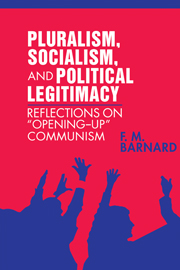Book contents
- Frontmatter
- Contents
- Preface
- 1 Introduction
- 2 The Context
- 3 Socialist pluralism and pluralist socialism
- 4 Ideological differentiation under socialism
- 5 Socialism and the language of sentiment
- 6 Socialism and the language of rationality
- 7 Socialism, politics, and citizenship
- 8 Conclusion
- Appendix: Electoral confrontation under socialism
- Index
4 - Ideological differentiation under socialism
Published online by Cambridge University Press: 25 January 2010
- Frontmatter
- Contents
- Preface
- 1 Introduction
- 2 The Context
- 3 Socialist pluralism and pluralist socialism
- 4 Ideological differentiation under socialism
- 5 Socialism and the language of sentiment
- 6 Socialism and the language of rationality
- 7 Socialism, politics, and citizenship
- 8 Conclusion
- Appendix: Electoral confrontation under socialism
- Index
Summary
We may agree that claims, to qualify as political claims, require general grounds for their justification and, at the same time, fail to agree on what constitutes generality in a given case. By the same token, we may share a general system of belief and, at the same time, differ over its interpretation in specific situations. A comprehensive belief system such as socialism, though it may command broad acceptance as the credal basis for a social order, may nonetheless be perfectly capable of divergent interpretations in particular circumstances. It appears that it is principally such divergent interpretations or “definitions” that pluralist socialists in Czechoslovakia had in mind in the 1960s when they searched for ways of political contestation under socialism. And it is in the light of this search that I speak of “ideological” differentiation within a socialist system of belief.
Clearly, this understanding of ideology has as little in common with terror, totalitarian regimes, overarching “isms,” or Weltanschauungen as it has with pejorative connotations tied to its Marxian origins. Clearly, too, this understanding demands a certain detachment of the word from the concept; for, though the word in its political use is indeed relatively new, the concept is of somewhat older vintage. Without going back farther than the eighteenth century, the concept, notably in its pejorative meanings of fraud, self-deception, or sinister manipulation, found frequent expression in the writings of Holbach, Helvetius, Diderot, Rousseau, and Herder, in their strictures of institutions that rendered humans an easy prey to fraud and delusion. In its nonpejorative use, too, the concept is older than the word.
- Type
- Chapter
- Information
- Pluralism, Socialism, and Political LegitimacyReflections on Opening up Communism, pp. 66 - 85Publisher: Cambridge University PressPrint publication year: 1992



